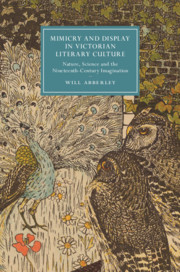 Mimicry and Display in Victorian Literary Culture
Mimicry and Display in Victorian Literary Culture The Evolution of Deceit in Grant Allen’s Fiction
Published online by Cambridge University Press: 16 May 2020
Chapter 3 examines Grant Allen’s fictions of criminal deceit, contending that they were shaped by his ideas about adaptive appearance. As a science populariser, Allen wrote repeatedly about the evolutionary dynamics of animal crypsis and advertisement. His crime tales often echo these dynamics as criminals’ deceptions compete with others’ detecting capacities. It is argued that, in tales such as ‘The Curate of Churnside’, Allen’s Darwinian view of deception clashes with the conventions of the sensation genre he was writing in. The genre tended to affirm a balance of cosmic justice in which criminals were usually exposed, if not punished. Conversely, Allen’s criminals often elude detection, having adapted perfectly to their environments. Allen did not present humans as simply equivalent to animals, though. He nurtured the hope that humanity would one day transcend nature’s primitive economy of deception. His novel An African Millionaire depicts criminal deception as a product of dysfunctional capitalism to be superseded by science and socialism. This political utopianism was offset for Allen, however, by a social Darwinist pessimism that caused him to doubt humans’ ability to overcome egoistic deceit. Indeed, Allen sometimes regarded his work as a professional writer as part of capitalism’s recapitulation of nature’s deceptions.
To save this book to your Kindle, first ensure [email protected] is added to your Approved Personal Document E-mail List under your Personal Document Settings on the Manage Your Content and Devices page of your Amazon account. Then enter the ‘name’ part of your Kindle email address below. Find out more about saving to your Kindle.
Note you can select to save to either the @free.kindle.com or @kindle.com variations. ‘@free.kindle.com’ emails are free but can only be saved to your device when it is connected to wi-fi. ‘@kindle.com’ emails can be delivered even when you are not connected to wi-fi, but note that service fees apply.
Find out more about the Kindle Personal Document Service.
To save content items to your account, please confirm that you agree to abide by our usage policies. If this is the first time you use this feature, you will be asked to authorise Cambridge Core to connect with your account. Find out more about saving content to Dropbox.
To save content items to your account, please confirm that you agree to abide by our usage policies. If this is the first time you use this feature, you will be asked to authorise Cambridge Core to connect with your account. Find out more about saving content to Google Drive.